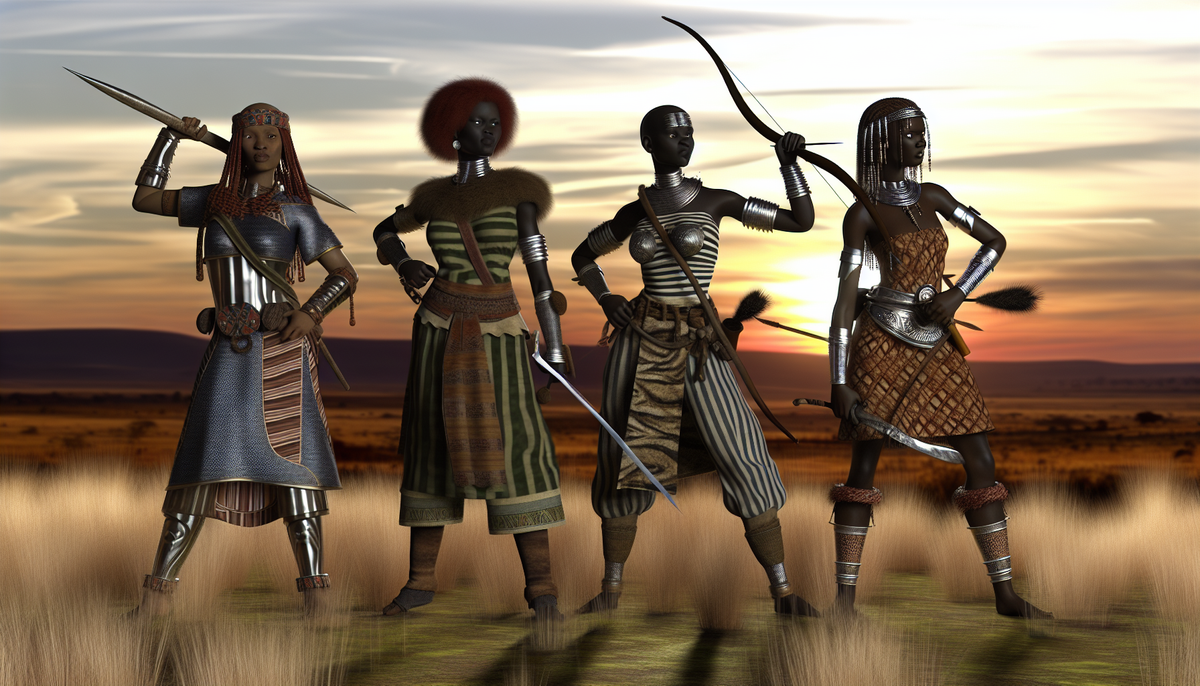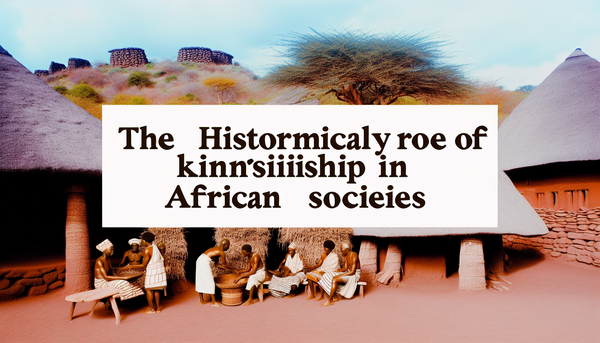Historic Women Warriors and Fighters in Africa

The Legendary Queen Amina of Zazzau
Queen Amina of Zazzau, also known as Amina of Zaria, was a formidable ruler who reigned in the 16th century in what is now Nigeria. Born around 1533, she was the daughter of a Hausa noble and inherited the throne of Zazzau (Zaria) after her brother’s death. Amina is celebrated for her extraordinary military prowess and strategic genius, transforming her city-state into a powerful kingdom.
Under her leadership, Amina expanded Zazzau's territory through successful military campaigns, conquering neighboring regions and strengthening trade routes. She is often credited with introducing innovations in warfare, including the use of iron weapons and cavalry. Her campaigns not only expanded her realm but also enhanced Zazzau's wealth and influence.
Beyond her martial accomplishments, Amina is also revered for her contributions to the cultural and social fabric of her kingdom. She advocated for women's rights and empowerment, challenging the traditional gender roles of her time. Amina’s legacy extends beyond her lifetime, as she became a symbol of strength and resilience for women in Africa. Her story continues to inspire generations, and she remains a prominent figure in the historical narrative of African warrior queens.
The Fearless Mino of Dahomey
The Mino, also known as the Amazons of Dahomey, were an elite, all-female military regiment that served the King of Dahomey, in present-day Benin, from the 17th century until the late 19th century. These women warriors were renowned for their bravery, discipline, and combat skills, often engaging in fierce battles alongside their male counterparts. The term 'Mino' translates to "our mothers" in Fon, signifying both their maternal role and their status as fierce protectors of the kingdom.
The formation of the Mino challenged traditional gender roles and showcased the capabilities of women in a dominantly patriarchal society. They were highly trained in various forms of combat, utilizing weapons such as swords, bows, and even firearms. The Mino were known for their fearlessness in battle, and tales of their valor spread far beyond the borders of Dahomey.
Queen Hangbe, who reigned in the early 18th century, played a pivotal role in formalizing this regiment, integrating them into the royal army as elite fighters. The legacy of the Mino endures as a powerful symbol of female strength and leadership in Africa, illustrating that women can be warriors and leaders, shattering the stereotypes of their time.
Nzinga Mbande: Strategist and Diplomat
Nzinga Mbande, the Queen of Ndongo and Matamba in present-day Angola, is celebrated as one of Africa’s most influential female leaders of the 17th century. Born in 1583, she was not only a formidable warrior but also an astute diplomat who adeptly navigated the complexities of colonialism and resistance against Portuguese expansion.
She ascended to power during a tumultuous period marked by the transatlantic slave trade, which sought to undermine her kingdoms. Nzinga's strategic mind was evident in her policies and military tactics. She skillfully formed alliances with the Dutch, leveraging external support to resist Portuguese intrusion and protect her people's sovereignty. Her famed negotiation skills were exemplified during the peace talks with Portuguese officials, where she famously arrived dressed as a man to assert her authority and challenge gender norms.
Nzinga was also a visionary leader, fostering cultural pride and promoting fortifications in her kingdoms. She embraced her role as a symbol of resistance against colonial forces, using diplomacy and military strategy to secure the future of her people. Her legacy continues to inspire generations, embodying strength, intelligence, and the relentless pursuit of justice in the face of oppression.
Yaa Asantewaa and the Ashanti Resistance
Yaa Asantewaa, born in 1840, was a formidable queen mother of the Ejisu in the Ashanti Empire, now part of modern-day Ghana. She is best known for her pivotal role in the Ashanti resistance against British colonial rule during the early 20th century, particularly during the War of the Golden Stool in 1900. This conflict arose when the British demanded the Golden Stool, a sacred symbol of Ashanti unity and identity, leading to widespread outrage among the Ashanti people.
As traditional leadership was challenged by colonial powers, Yaa Asantewaa emerged as a powerful voice. She rallied her people, calling for a united front against the British, and her determination galvanized thousands of warriors to join her cause. Yaa Asantewaa's leadership was marked not only by her strategic military insight but also by her unwavering commitment to the protection of her culture and the dignity of her people.
The war ultimately ended with the British gaining control, but Yaa Asantewaa's legacy as a fearless leader and a symbol of resistance has endured. She represents the spirit of defiance against colonial oppression, inspiring future generations to fight for justice, self-determination, and cultural preservation in Africa.
The Warrior Queen Moremi Ajasoro
Moremi Ajasoro, a legendary figure in Yoruba history, was a brave queen and warrior who played a crucial role in the defense of her people against invading forces in the 12th century. Originating from the Ife kingdom in present-day Nigeria, Moremi's saga is a powerful story of sacrifice and cunning. When her homeland faced a relentless assault from the invading armies of the neighboring kingdom of Benin, Moremi took it upon herself to save her people.
In a daring act, she infiltrated the enemy's ranks by marrying the king of Benin, seeking to gather intelligence about their strategies and weaknesses. Through her courage and intelligence, she learned vital information that would aid her people in their struggle. Moremi's strategy culminated in a bold counter-attack, help orchestrating a successful revolt against the invaders.
Her legacy, deeply rooted in themes of bravery, loyalty, and sacrifice, remains alive in Yoruba culture, as she is honored as a symbol of feminine strength. Moremi Ajasoro's story not only celebrates her heroism but also emphasizes the importance of cleverness and resilience in the face of adversity. She continues to inspire voices in the modern era, illustrating the enduring impact of women's leadership in Africa.
Gudit: Conqueror and Ruler of Ethiopia
Gudit, also known as Judith, was a powerful and enigmatic queen who ruled in Ethiopia during the late 10th or early 11th century. Her reign is often overshadowed by the legendary tales surrounding her conquests, which have made her a prominent figure in Ethiopian folklore. Gudit is best known for leading a successful military campaign against the Aksumite Empire, renowned for its wealth and influence at the time.
Driven by a desire for revenge against the Aksumites, who had oppressed her people, Gudit's strategic brilliance and fierce leadership united various ethnic groups in her quest for liberation. With her armies, she reportedly captured the Aksumite capital, desecrated its churches, and marked a significant shift in the region's power dynamics. Her triumph not only dismantled the Aksumite Empire but also established her as a ruler in her own right.
Though much of Gudit’s life remains shrouded in mystery, her legacy endures as a symbol of resistance against colonial rule and tyranny. She is celebrated as one of Ethiopia’s most compelling historical figures, embodying themes of female empowerment and valor. Gudit’s story continues to resonate, inspiring generations to embrace their history and fight against injustice.
Sarraounia Mangou: The Lioness of Azna
Sarraounia Mangou, known as the Lioness of Azna, was a fierce and strategic leader in the late 19th century, leading her people, the Azna, in what is now Niger, against French colonial forces. Born into a noble family, Sarraounia showcased her exceptional leadership abilities from a young age. Upon the death of her husband, she stepped into her role as queen and warrior, determined to protect the independence and culture of her people amidst growing colonial threats.
Sarraounia earned her nickname, the Lioness, through her courage and tenacity in battle. Her notable achievement came during the Battle of Tamaske in 1899, where she firmly resisted the encroaching French troops. Utilizing guerrilla tactics, her warriors engaged in fierce skirmishes, successfully inflicting significant casualties on the colonial forces. Sarraounia's ability to inspire and unite her people became a crucial aspect of her resistance.
Though ultimately defeated, Sarraounia Mangou's legacy endures as a symbol of resilience and defiance against colonial oppression. Her story highlights the vital role of women in leadership and as warriors, inspiring future generations to honor their heritage and fight for their rights. The Lioness of Azna remains an enduring figure in the collective memory of African resistance against colonialism.



